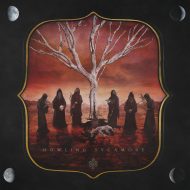 Do sycamores howl? Well, seeing who is involved with this, they probably do. The name, which stuck out for me, was Davide Tiso of Ephel Duath. This told me to expect highly challenging, indeed weird musical patterns. But it’s not just about Davide Tiso. With him on this project are vocalist Jason McMaster of WatchTower, and drummer Hannes Grossmann of Necrophagist and Obscura, along with guests from Yakuza and Gorguts.
Do sycamores howl? Well, seeing who is involved with this, they probably do. The name, which stuck out for me, was Davide Tiso of Ephel Duath. This told me to expect highly challenging, indeed weird musical patterns. But it’s not just about Davide Tiso. With him on this project are vocalist Jason McMaster of WatchTower, and drummer Hannes Grossmann of Necrophagist and Obscura, along with guests from Yakuza and Gorguts.
Sure enough, “Upended” has elements of metal, which are distinguishable but organised in a way that suggests, well, disorganisation. But it’s not. The ambiance arising from this extreme-jazz-power assault is unsettling, disturbing and agonised. At the same there is drive and energy. Whilst some see this as cacophony, I certainly don’t. I loved the energy and bizarre formula and outward creativity. So long as you don’t expect normality, and are prepared to embrace the disharmonious, experimental progressive patterns, then this self-titled album is rather good. “Obstinate Pace” is typically disturbed and grey in its extreme crumbliness. A melancholic sax enters the bleak drudgery and agony, which this piece of avant-garde extremity succeeds in conveying. It’s like an open invitation to insanity. Each song has its own warped personality. If I were to compare this album to anything, it would be Norwegian progressive metal bands like Atrox and Audrey Horne. But on top of the theatrically expressive vocals of a madman, the Tiso influence is evident in the multi-coloured guitar patterns, which are downbeat, shifting and expressive. The music is sharp.
After being treated to a little “Intermezzo” – even this comes from land of symphonic distortion – the musical massacre continues. “Midway” is essentially a progressive metal song with all the emotional emphasis, but it’s intense in an extreme way. A delicate heart-wrenching progressive song follows. This section of the album made me think that at heart this is progressive music, but delivered in a strange way. What’s the point? The tribal opening of “Descent to Light” was more interesting, I thought. The build-up is dramatic. The drumming is urgent. The vocalist’s off key tone doesn’t help the continuity, but the instrumental drama continues a lit bit in the vein of Loch Vostok but with elements of Opeth and classic metal thrown into this essentially progressive piece. The album dies off quietly and atmospherically with “Dysphoria”.
Howling Sycamore prove they are more progressive than progressive, if indeed the genre matters. There are elements of all styles somewhere in this eclectic work. I couldn’t find much continuity in it, but experimental music was never supposed to be that way. Far better this than strange variations of a classic progressive style. The most inspiring sections of this album, of which are many, occur when Howling Sycamore just “go for it” and engage in theatrically inexplicable experimental structures.
(7.5/10 Andrew Doherty)
https://www.facebook.com/howlingsycamore
https://howlingsycamore.bandcamp.com

Leave a Reply